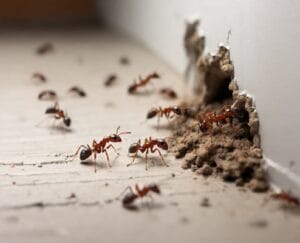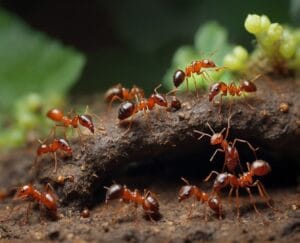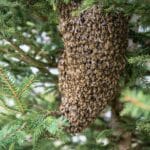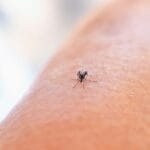Ants are clever little creatures, but with the right strategies, we can keep them from turning our homes into their playground. Let’s get right into it.
Key Takeaways
- Seal any cracks and crevices to prevent ants from entering your home.
- Maintain a clean kitchen by promptly wiping up spills and storing food in airtight containers.
- Trim back trees and bushes from your house to remove ant pathways.
- Regularly inspect and fix any water leaks to remove sources of moisture that attract ants.
- Consider natural repellents like cinnamon and peppermint oil for a safe and effective way to deter ants.
Home Sweet Home: Making It Ant-Proof
When it comes to ant prevention, your home is your castle, and you’re the gatekeeper. It’s all about creating barriers that ants can’t cross. Think of it like this: if your home were a fortress, ants are the invading army. The goal is to strengthen your defenses so that the ants will decide it’s not worth the effort.
Seal the Deal: Blocking Entry Points
First things first, we need to cut off the ants’ entry points. Ants can sneak in through the tiniest of gaps, so it’s our job to find and seal them. Grab some caulk and weatherstripping and follow these steps:
- Inspect the exterior of your home for any cracks or holes.
- Check around windows, doors, and where utility pipes enter the home.
- Use caulk to seal up any openings you find.
This isn’t a one-time deal, though. The house settles, and new cracks can appear, so make this a regular part of your home maintenance routine.
Crumb Control: The Basics of Kitchen Hygiene
Ants march into our homes with one thing on their minds: food. That’s why the kitchen is often ground zero for an ant invasion. But here’s the secret weapon: cleanliness. Keeping your kitchen spotless is the most effective way to send those ants marching right back out the door.
- Wipe down surfaces after every use to remove food residue.
- Store food in sealed containers—this includes pet food!
- Don’t leave dirty dishes out; wash them promptly or at least soak them in soapy water.
It’s all about removing the temptation. No food, no ants. It’s as simple as that.
Outdoor Defense: The Starting Line of Ant Prevention
Your home’s exterior is the frontline in the battle against ants. It’s where you can stop them in their tracks before they ever get a chance to cross the threshold. Let’s fortify the outside to keep the inside safe. For more information, check out these simple ant control tips.
Landscape and Garden Maintenance
The greenery surrounding your home might look beautiful, but it can also serve as a superhighway for ants to enter. Here’s how to nip that in the bud:
- Trim back any tree branches or bushes that touch your house. These can act as bridges for ants.
- Keep mulch, which can be a cozy home for ants, at least a few inches away from your home’s foundation.
- Consider using stone or rock-based landscaping near the perimeter of your house as ants are less likely to set up camp there.
These simple changes can make a world of difference in keeping ants at bay. For more detailed strategies, check out ant control tips to ensure your home remains invasion-free.
Trimming Vegetation Away from Your Home
It’s not just about aesthetics. Trimming vegetation is a strategic move. Overhanging branches or dense shrubs against your walls are like rolling out the red carpet for ants. Keep them trimmed and your home will be much less inviting.
Mulch and Compost Strategies
Mulch and compost are fantastic for your garden, but they’re also ant magnets. To avoid creating an ant haven, keep compost bins sealed and mulch dry. If possible, use less attractive alternatives like rubber mulch.
Trash and Debris Management
Ants aren’t picky eaters. Your trash is their treasure. Managing waste effectively is key:
- Ensure that your trash bins have tight-fitting lids to prevent ants from getting in.
- Take out the trash regularly to avoid buildup that could attract ants.
A clean and tidy yard means there’s less for ants to feed on and fewer reasons for them to come calling. For more detailed strategies, check out our effective natural pest control solutions.
Securing Trash Bin Lids
It sounds simple, but securing trash bin lids can be one of the most effective ant deterrents. A heavy stone or a bungee cord can do the trick. The goal is to make it difficult for ants to access the trash and find food sources.
Regular Disposal of Waste
Regularly taking out the trash is just as important as securing it. The longer waste sits, the more likely it is to attract ants. Make it a routine, and you’ll be cutting off another food source for these pests.
Fortify the Interior: Fortress Tactics to Keep Ants Out
Now, let’s turn our attention to the inside of your home. This is where you live and where you definitely don’t want ants to settle in. We’re going to build an invisible barrier that will make ants think twice before setting up shop.
Food Storage and Protection
Ants have a powerful sense of smell and can detect even the tiniest crumb from afar. Ensuring that all food is stored properly is essential in making your home less appealing to these persistent invaders.
Airtight Containers and Fridge Use
Invest in airtight containers for pantry items like sugar, flour, and cereals. And don’t forget the fridge. Storing ripe fruit in the refrigerator instead of on the counter can help keep ants away. It’s a simple switch that makes a big difference.
Proper Pet Food Storage
Pet food is a feast for ants. Store your furry friend’s food in airtight containers and never leave food out in bowls overnight. Feeding pets during specific times and promptly cleaning up can also help prevent ant problems.
Water Control Within Your Domain
Ants aren’t just after food; they need water too. Eliminating sources of moisture is crucial in creating a dry, unattractive environment for ants.
Fixing Leaks and Eliminating Dampness
Check for leaky faucets, pipes, and any other areas that might collect water. Fixing these issues promptly can deter ants. Using a dehumidifier in damp areas like basements can also make your home less hospitable to ants.
Routine Plumbing Checkups
Don’t wait for a leak to become a flood. Regular plumbing checkups can catch small problems before they become big ones. Plus, a dry home is less likely to have ant visitors.
Natural vs. Chemical Warfare: Choosing Your Ant Control Arsenal
When it comes to keeping ants out, you’ve got options. Natural methods can be effective and are often safer around kids and pets. But sometimes, you might need to bring out the big guns with chemical solutions. Let’s weigh our options.
Harnessing Nature’s Power
Nature has given us plenty of tools to fight off ant invasions. Here are some of the best:
- Cinnamon, peppermint oil, and vinegar are not just for cooking—they’re natural ant repellents.
- Placing bay leaves in cabinets, drawers, and containers can help ward off ants.
These natural remedies are not only safe but also provide a pleasant aroma to your home.
Essential Oil Repellents
Essential oils are a powerhouse when it comes to repelling ants. A few drops of peppermint, tea tree, or eucalyptus oil mixed with water can create a natural spray that keeps ants at a distance. Just remember to reapply regularly for the best effect.
Diatomaceous Earth Application
Diatomaceous earth is a fine powder that’s deadly to ants but safe for humans and pets. Sprinkle it around entry points and in areas where you’ve seen ants. It’s like laying down a barrier of tiny razor blades that ants can’t cross without getting cut.
When to Use Chemical Solutions
Surface Sprays and Baits
There are times when natural methods might not cut it, especially during a full-blown ant invasion. That’s when you might consider surface sprays and baits. These chemical solutions can be highly effective, but they should be used with caution. Always follow the instructions on the label, and keep them away from children and pets.
Ant baits work by attracting ants to a toxic substance that they then carry back to their nest, effectively eliminating the entire colony. Surface sprays can create a barrier that ants won’t cross. Remember, these are potent tools, so use them responsibly.
Understanding Insecticide Safety
It’s important to remember that insecticides are poisons designed to kill insects. When using any chemical solution, wear gloves and ensure good ventilation. If you’re uncertain about using these products, don’t hesitate to contact a professional for advice.
Ant Alert: Monitoring and Swift Responses
Being proactive is the key to keeping your home ant-free. Regular monitoring can alert you to potential issues before they become serious. If you spot a few ants here and there, it’s time to spring into action before those few become a few hundred.
Regular Home Inspections for Early Detection
For example, during your routine home inspection, you might notice a trail of ants near a window. This could indicate a nearby nest or a food source they’re exploiting. Immediate action, such as cleaning the area and sealing the window, can prevent a larger infestation.
Check common ant hot spots like the kitchen, bathrooms, and along the exterior foundation of your home. Look for ant pathways or nests and take action if you find any.
Setting Traps and Contacting Professionals
If you’re dealing with a persistent ant problem, traps can be an effective solution. Place them along ant trails and near entry points. If the situation escalates, or if you’re dealing with carpenter ants which can cause structural damage, it’s time to call in the pros. Pest control professionals can provide a more comprehensive solution and help identify and rectify the root cause of the problem.
Frequently Asked Questions
What Are the Most Effective Natural Ant Repellents?
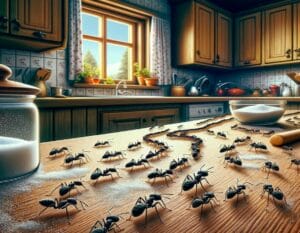
Some of the most effective natural ant repellents include vinegar, essential oils like peppermint and tea tree oil, and diatomaceous earth. Each has its own method of deterring ants, from disrupting their scent trails to physically harming them on contact.
How Often Should I Inspect My Home for Ants?
It’s a good idea to inspect your home for ants at least once a season. Ants can be more active in the spring and summer, so pay extra attention during these times. However, changes in weather, like heavy rain, can also drive ants indoors, so adjust your inspections accordingly.
What Should I Do If I Find a Large Ant Colony?
If you find a large ant colony, it’s best to contact a pest control professional. They have the expertise and equipment to safely and effectively remove the colony. Trying to handle a large colony on your own can lead to the ants scattering and creating more colonies.
For instance, if you disturb a large ant mound in your yard without properly eliminating it, the colony could relocate closer to your home, leading to an even bigger problem.
Can Ants Cause Structural Damage to My Home?
Certain types of ants, like carpenter ants, can cause structural damage to your home. They excavate wood to build their nests, which can weaken the structural integrity over time. If you suspect carpenter ants, it’s critical to address the issue immediately.
How Can I Ant-Proof My Home During Rainy Seasons?
During rainy seasons, ants often seek shelter indoors. To ant-proof your home, ensure proper drainage around your foundation, fix any leaks promptly, and keep your home’s interior dry with dehumidifiers if necessary. Additionally, maintain a regular home inspection schedule to catch any potential ant issues early on.
In conclusion, keeping your home free from ant invasions requires a combination of proactive measures, from sealing up entry points and maintaining cleanliness to using natural or chemical repellents when necessary. With these strategies in place, you can enjoy a home that’s both comfortable and ant-free.

